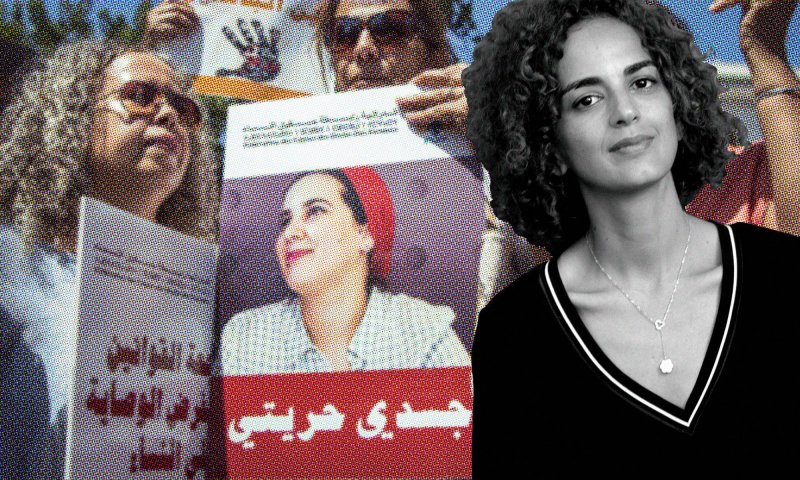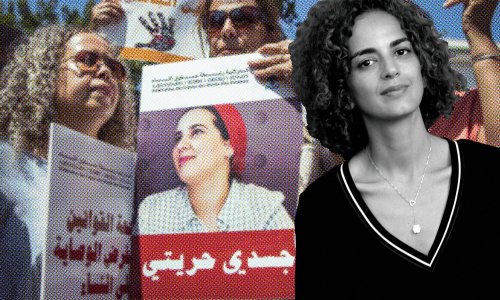We are outlaws ... we are violating obsolete and outdated laws. We have had sex outside of wedlock, we have had and have been complicit to abortions”
This cri de coeur written in French is a petition "against the morality police and demanding the legalization of abortion", signed by 490 Moroccans led by author Leila Slimani and published in Le Monde on September 23 in conjunction with the fourth session of the trial of Moroccan journalist Hajar Raissouni, this petition was translated and republished on Morrocan sites.
Raissouni is on trial for aborting and having extramarital sex, but she believes that the trial is politically motivated due to her being related to a prominent Islamist leader, Ahmed Raissouni, she also works for an opposition newspaper. Her trial drew widespread criticism amongst human rights defenders both domestically and internationally amid calls for the lifting of restrictions on women's bodies and granting them the freedom to do what they like with their bodies.
My Body Is Mine
The petition was co-written by French-Moroccan journalist and writer Leila Slimani, a prix Goncourt winner in 2016, she was chosen by President Macron as Francophonie representative in 2017, and director Moroccan Sonia Trapp urging Moroccan authorities to open a debate on "individual freedoms and decriminalization of sexual relations (outside marriage)".
Although it is primarily a women’s cri de Coeur, a number of men have shown solidarity with the cause and signed the petition. Signatories hail from all walks of life and include entrepreneurs, academics, housewives, artists, teachers, mothers and bankers.
The petition carried 490 signatures in a symbolic reference to article 490 of the Moroccan Penal Code which forbids any sexual relationship outside marriage. Anyone convicted is punished by imprisonment.
The petition which addresses men stresses that "The culture of lying and social hypocrisy leads to violence, abuse and intolerance. These laws which destroy freedom and which cannot be applied, have become instruments of political or personal revenge,"
"I can no longer stand this, my body is my own it does not belong to my father or my husband nor to those around me, nor to the eyes of men on the street and even less so to the state," she said.
Laws criminalizing sex outside marriage have become instruments of political and personal revenge in Morocco. Leila Slimani co-authored a petition that carried 490 signatures in a reference to article 490 which forbids relationships outside marriage
In 2018 alone, Moroccan courts have ruled against 14,503 people on charges of debauchery, including 3048 people on charges of adultery, 170 on charges of homosexuality and 73 on charges of abortion. Where does it stop?
Trapp, 33, told AFP that “women of all walks of life have taken part in this campaign, teachers and bankers, housewives and students, artists and intellectuals," while Slimani pointed out that the petition aims to "defend all those lives that have been destroyed by shaming, disgracing and imprisonment".
The petition was inspired by a feminist statement known as the "The manifesto of the 343” that shook up France's abortion law in the early 1970s.
Raissouni’s Fourth Hearing
The fourth hearing of young Moroccan journalist Hajar Raissouni, her fiancé, her doctor and his assistants on 23 September dragged on for nine hours before ending with a decision to postpone the trial until September 30 and rejecting all defendants' defences, claiming they had been “caught in the act” of abortion.
Raissouni’s defense lawyer Abderrahmane Benamrou demanded her acquittal on charges of debauchery and participation in abortion expressing his fear that “there is a plot being carried out”.
He explained in his defence that there is no confusion about the existence of a marital relationship and that "it must be inferred from their statement that they consider themselves a married couple and consider the contract a formality” As for the abortion, he said that the statements of the doctor deny that Raissouni had had an abortion and that doctors who conducted the medical examination of Raissouni "did not take an oath."
The doctor's defence lawyer Mariam Al Idrissi presented to a judge a letter signed by 2000 doctors from 17 medical organizations to express their respect for the doctor and a statement of solidarity.
"I refused to undergo the medical examination,” Raissouni told the judge. "I asked the doctor what he would do, and I told them to give me the legal justification for your medical investigation after they denied me my right to communicate with the lawyer."
The Judge: Caught in the Act
On the other hand, the judge refused the request of Raissouni’s defence team to invalidate the medical report and believed that it was in conformity with criminal procedure laws. He also considered that it was a case of “in flagrante delito” or of being caught in the act claiming that being caught in the act was not limited to the moment it happened but for a short period after it.
In response to Raissouni's talk of torture and forced medical examination, the judge believed that there was nothing to prove it happened adding that her state of ill health required that she undergo examination.
The judge reiterated his refusal to release Raissouni or the rest of the defendants temporarily pending trial.
Attending the session were Ahmed Benchemsi, director of communication and advocacy at the Middle East and North Africa division of Human Rights Watch, and two prominent human rights activists from the Moroccan Association for Human Rights (AMDH) Ahmed Al Haej and Khadija Al Riyadi
who were Raissouni’s former bosses and her cousin the journalist Youssef Raissouni.
In 2018 alone, Moroccan courts have ruled against 14,503 people on charges of debauchery, including 3048 people on charges of adultery, 170 on charges of homosexuality and 73 on charges of abortion, according to official figures.
It is also estimated there are between 600 and 800 clandestine abortions a day.
Raseef22 is a not for profit entity. Our focus is on quality journalism. Every contribution to the NasRaseef membership goes directly towards journalism production. We stand independent, not accepting corporate sponsorships, sponsored content or political funding.
Support our mission to keep Raseef22 available to all readers by clicking here!
Interested in writing with us? Check our pitch process here!






